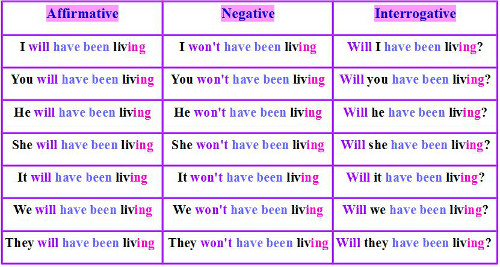Future Perfect Continuous
The Future Perfect Continuous indicates a continuous action that will be completed at some point in the future. The Future Perfect Continuous is a tense that natives of English don’t use a lot, becoming, because of that, complicated to learn. However for advanced levels it’s extremely necessary the understanding and use of it. A striking quality of this tense is that it expresses something very precise, when we use it we give the exact intent of what we mean to our interlocutor. / O Futuro Contínuo Perfeito indica uma ação que será completada em algum ponto no futuro. Ele é um tempo verbal pouco usado pelos nativos do inglês, o que torna o seu aprendizado um pouco mais difícil. Porém, seu entendimento é de extrema necessidade para quem busca a fluência na língua. Uma qualidade marcante desse tempo verbal é que ele expressa algo muito preciso, pois, quando o utilizamos, passamos a exata intenção do que queremos dizer para nosso interlocutor.
The future perfect continuous is formed by two elements: the future perfect of the verb “to be” and the present participle of the main verb (base + ing). / O Futuro Contínuo Perfeito é formado por dois elementos: o futuro perfeito do verbo “to be” e o particípio presente do verbo principal.
Example: / Exemplo:
"Next Friday, I will have been studying on this book for one week.”
Na próxima sexta, fará uma semana que estarei estudando este livro.”
Form: / Forma:
Subject + will + have been + present participle
(Sujeito + will + have been + particípio do presente)
She will have been reading.
Subject: She
will + have been: will have been
present participle: reading
Examples: / Exemplos:
As I'll arrive at the airport at 6 p.m, when you arrive at 8 p.m I will have been waiting you for two hours.
Tradução literal: Como chegarei ao aeroporto às 18hrs, quando você chegar às 20hrs, fará duas horas que eu estarei esperando por você.
By 2018 I will have been living in London for a year.
Tradução literal: Em 2018 fará um ano que eu estarei vivendo em Londres.
When I finish the trainee, I will have been learning Math for two years. /
Tradução literal: Quando eu terminar o estágio, fará dois anos que estarei aprendendo matemática.
By December of next year I will have been working there for six months.
Tradução literal: Em dezembro do ano que vem, fará seis meses que estarei trabalhando lá.
Let's see the conjugation in Affirmative, Negative and Interrogative of the future perfect continuous tense: / Vejamos a conjugação nas formas afirmativa, negativa e interrogativa do tempo verbal futuro contínuo perfeito:

Nota: A tradução do “future perfect continuous” para a língua portuguesa é apenas uma tentativa de exemplificar as inúmeras possibilidades de tradução desse tempo.

